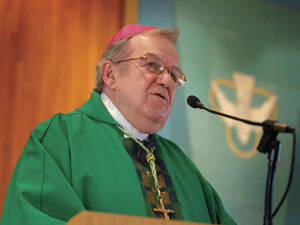Under persistent criticism from a small but vocal group of activists as well as questions from some bishops, leaders of the Catholic Campaign for Human Development have established “stronger policies and clearer mechanisms” to guide how grants are awarded to poverty-fighting groups and to strengthen oversight of how grants are spent. The plan places greater emphasis on the Catholic identity of the 41-year-old program and renews the U.S. bishops’ commitment to fight poverty in all its forms, said Bishop Roger P. Morin of Biloxi, Miss., chairman of the bishops’ subcommittee for the campaign.
“There were those who were concerned that renewal in some way might mean moving away from a priority of helping the poor achieve greater self-sufficiency. There is a reaffirmation that the C.C.H.D. will continue to have a priority for the poor and in helping the poor to help themselves. That has not changed,” Bishop Morin said on Oct. 26.
“For C.C.H.D., its focus always was on poverty and trying to always find the best method of dynamics or organization to address poverty at the local level,” he said.
A 15-page document outlining the changes, The Review and Renewal of the Catholic Campaign for Human Development, provides a road map for the renewal of the program. C.C.H.D. has been under fire since 2008 from critics who claim the program has lost its way by funding organizations that joined coalitions taking positions contrary to Catholic teaching on such issues as abortion and same-sex marriage. In recent years at least eight bishops have decided not to participate in the annual collection, citing questions about the activities of groups being funded. C.C.H.D.’s emphasis on funding programs that empower poor and low-income people largely through community organizing activities has been the target of critics almost since the program started in 1969. Bishop Morin said five of the 270 organizations funded in the 2008-9 grant cycle lost their awards for violating grant guidelines.
Bishop Morin said the review allowed C.C.H.D. officials to recommit to the program’s founding principles, including its Gospel-based mission of seeking justice rooted in Catholic social teaching. “I don’t think there is anything wrong [in seeking] to get the government to assume its legislative responsibility of the well-being of the people,” Bishop Morin said. “In order to do that, you have to be organized.”
The new commitments include the creation of a review board to hear complaints about the activities of funded organizations and a redesign of grant applications so that they include an explanation that C.C.H.D.’s mission is based on Catholic social and moral teaching.








